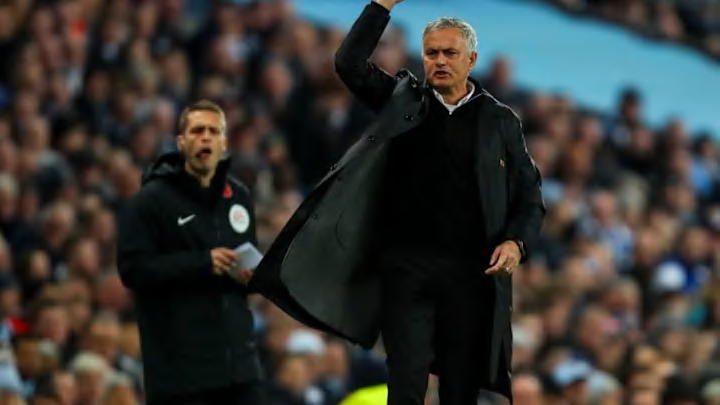Jose Mourinho’s negative team selection left Manchester United out of ideas during a 3-1 derby defeat to Manchester City.
Managers and pundits often talk about getting the balance between defense and attack right, particularly for the big games in the Premier League.
Usually those who don’t strike the right balance are accused of putting too much emphasis on going forward at the expense of cover and structure in defense and midfield.
Yet it can work the other way too, as Manchester United found out to their cost in Sunday’s 3-1 derby defeat away to leaders Manchester City. United were let down by a negative team selection as Jose Mourinho skewed the balance too much toward negating instead of creating.
Rather than threaten City with some forward-thinking quality, Mourinho populated his starting XI with two types. He had one-dimensional runners up front and holders in midfield.
Those decisions left United long on graft but short on craft. A workmanlike team allowed City to dominate possession, playing right to the champions’ strengths as they toyed with and outclassed their local rivals.
Paul Pogba’s injury meant the midfield was already going to miss some flair. But Mourinho compounded the Frenchman’s absence by opting for Nemanja Matic, Ander Herrera and Marouane Fellaini, three midfielders more concerned with breaking up play than directing it.
The lack of assured ball-players led to some scary possession statistics early on, even for a team intending to play on the break away from home:
Wow...#MCIMUN
— Match of the Day (@BBCMOTD) November 11, 2018
📻📱👉 https://t.co/yStWnOdcZ4 pic.twitter.com/myowumm6HO
Pogba missing out needn’t have been the death knell for United’s creativity from midfield. All Mourinho needed to was start Juan Mata in a central role where the Spaniard has often thrived.
Inexplicably, though, Mata, who has been in fine fettle lately, was left on the bench.
Without Mata’s ability to thread passes between the lines, United were content to try and go long and release pace up top. Mourinho had picked forwards who offer direct pace and little else in the form of Anthony Martial, Marcus Rashford and Jesse Lingard.
The problem is none of these straight-line runners is adept at creating chances for the others. Nor do they thrive when dropping deeper to join the play.
Those drawbacks made the sudden decision to drop Alexis Sanchez baffling. Sanchez had started United’s previous two matches, both wins, playing as a center-forward.
His more perceptive movement had lent greater fluidity to the Red Devils’ front three. Meanwhile, Sanchez has always had an eye for a pass, something he proved with a smart assist to tee up Martial to score in the 2-1 win away to Bournemouth last time out.
At his best, Sanchez is equally adept at creating goals as he is scoring them. His vision and artful passing, combined with Mata’s technique, would have more than offset Pogba not being available.
Yet Mourinho left two of his most-skilled attacking talents sitting on the lumber. Their omissions spoke volumes about the preference for pragmatism over progression currently holding United back.
Mourinho is too often content to err on the side of caution, despite the ample quality in forward areas at his disposal. The habit meant Sanchez was wasted, even after the former Arsenal man was finally introduced in the 73rd minute, the same moment Mata entered the fray at last.
Asking these players to suddenly boss the ball in a game City controlled was an unrealistic and unreasonable expectation. It didn’t help the base of midfield was still lacking in ideas when it came to supplying United’s danger men:
Romelu Lukaku: On in minute 57 - 3 passes
— Peter Staunton (@petermstaunton) November 11, 2018
Alexis Sanchez: On in minute 73 - 1 pass
Phil Foden: On in minute 92 - 7 passes
Mourinho took his side to the Etihad with a clear remit to defend, defend and defend some more. Anything United could get at the other end would be a bonus rather than the fruits of forward-thinking labor.
In fairness to Mourinho, he probably counted on his players with natural defensive tendencies to defend better:
Lindelof is literally pointing at Gundogan for Matic to pick him up. Abysmal from Matic. #mufc
— Samuel Luckhurst (@samuelluckhurst) November 11, 2018
Yet the fact his attempt to stifle City playmakers like David Silva fell so flat, raises the question: Why didn’t United risk having a go? It wouldn’t even have meant overloading the team in forward areas.
All it would have required is for Mourinho to trust the flair players he has.
Of course trusting so-called “luxury players” has never been a strong suit of Mourinho’s. Both Kevin De Bruyne and Mohamed Salah languished under him at Chelsea before taking their niche skills elsewhere and thriving.
Mourinho used to be the master of setting up his teams to take points from big games. But there was always a balance between guile and pragmatism, with an Eden Hazard or Arjen Robben around to complement every Claude Makelele or Matic.
No such balance exists at United, though, where the players who can create are too quickly cast aside for those who negate when the games get bigger. It’s why City coasted through the derby and why United remain miles off the pace in England’s top flight.
